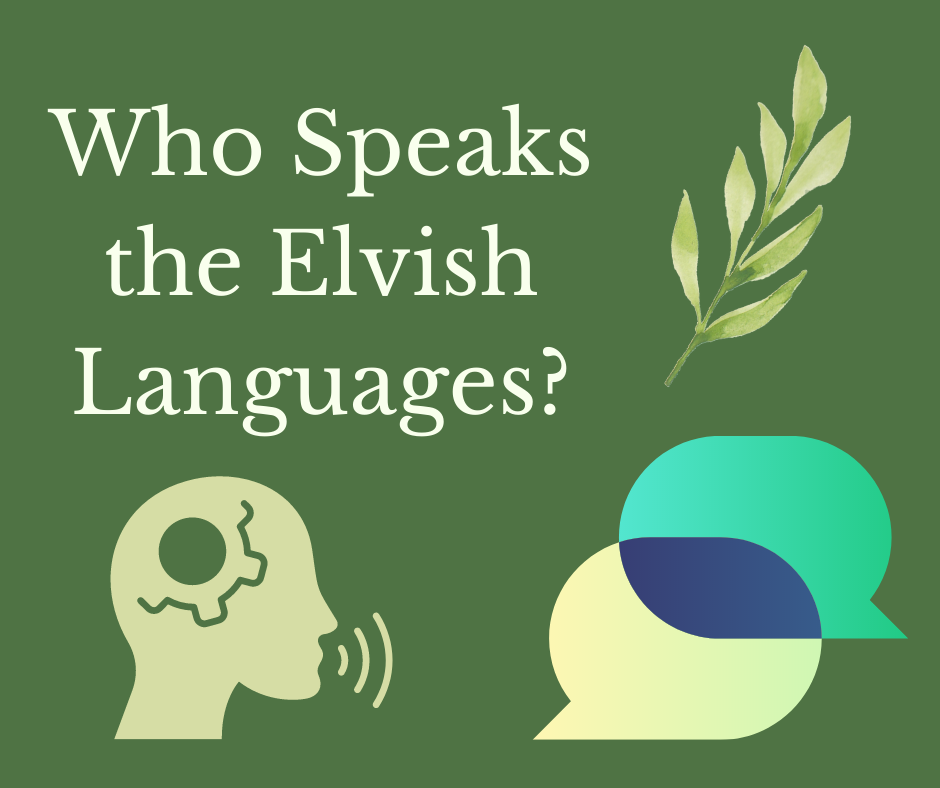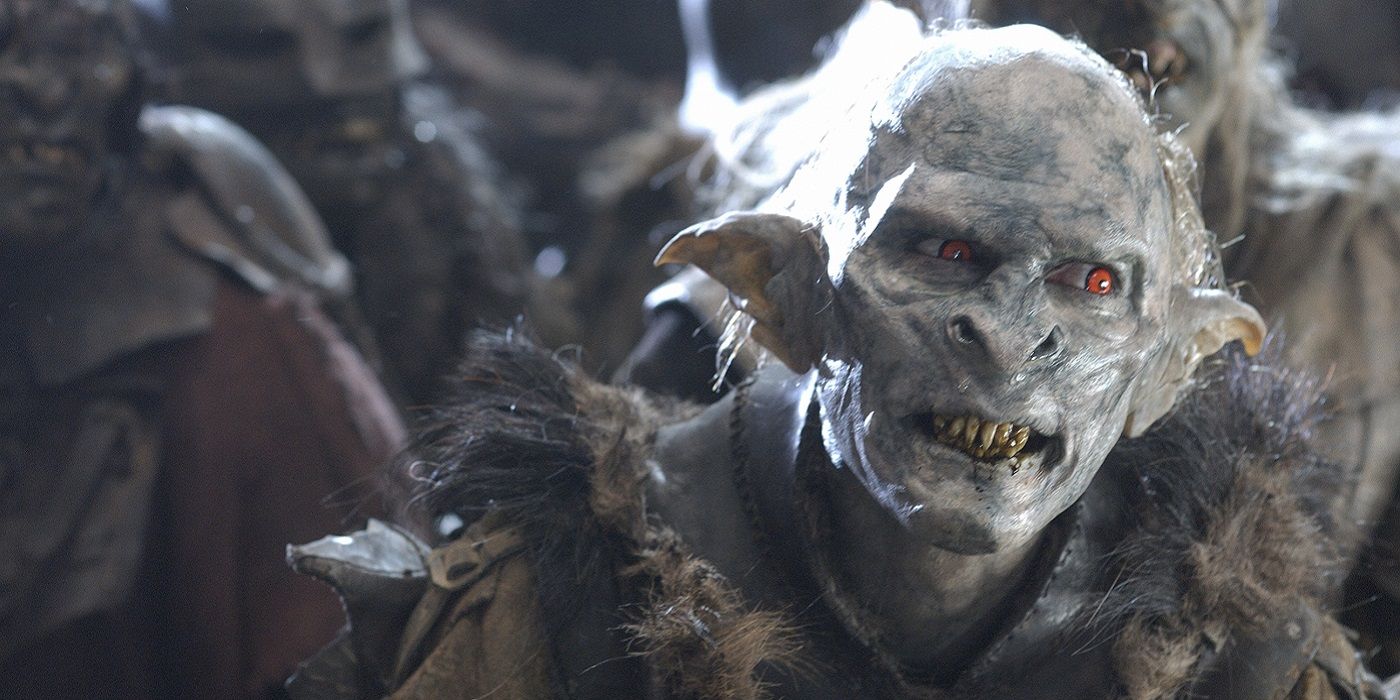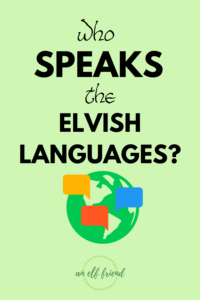
Now, we are going to discuss who speaks the Elvish languages. There are the Elves, Men, Hobbits, Ents, Orcs, Trolls, and Dwarves – they all spoke a language of Middle-earth.
Before, we discussed the Quenya Alphabet, which is all about the alphabets of the two main Elvish Languages: Quenya and Sindarin.
The Elvish Languages
Tolkien had a lot of languages, which are the driving forces of his works in The Hobbit and The Lord of the Rings. They were inspired by his knowledge of “real-world languages,” such as English, German, Latin and Finnish, and also other authors such as Owen Barfield and Jonathan Swift, citing them as influences.
The Elves are the main inhabitants of such languages, as “Elvish Languages” is used quite commonly when referring to the Languages of Middle-earth. All the other languages spoken by the other races (species?) are enriched by the Elvish Languages – especially the “Common Speech” of the Men.
The Elvish Languages were not only spoken by the Elves, especially in the First and Second Ages.
Additionally, in The Lord of the Rings, Tolkien states that there’s a “Common Speech,” which is mentioned and used by many of these species, probably aside from the Elves, who prefer their Elven tongues, as they lived in the old kingdoms of Arnor and Gondor.
This “Common Speech” is also called Westron, as it is the common speech of the West-lands in Middle-earth in the Third Age (TA).
While it is unknown whether the other unmentioned races spoke Elvish Languages or not, for the sake of this post, we are going to stick to the 7 that Tolkien mentions in Lord of the Rings App. F.
Table of Contents

Elves

In the Languages of the Elves, there were two main branches:
- West-elves, or the Eldar, and
- East-elves, which are most of the Elven-folk in Mirkwood and Lórien.
All languages are in Eldarin form, which are Quenya and Sindarin.
However, Quenya and Sindarin had different “types,” they are:
- High-Elven, which eventually became known as Elven-Latin
- Grey-elven, which is similar to Quenya
There is one called High-elven, which is the ancient tongue of Eldamar. This is the first written one. It eventually became known as a form of ‘Elven-Latin.”
It may be thought of as similar as the Latin language. As this is usually reserved for ceremonies, and high matters of lore and song by the High Elves.
The second written one was Grey-elven, akin to Quenya, which is the language of those along the coasts of Beleriand, but haven’t pased over the sea. They were ruled under King Thingol, Greycloak of Doriath, and their tongues changed with mortal lands (depended on how they were).
Furthermore, the Exiles (who dwell with the Grey Elves) adopted Sindarin, which is then known as the tongue of Elves and Elf-lords.
Men

Tolkien describes Westron as a “mannish speech,” though it was also enriched and softened under Elvish influence.
The origin of Westron was “Fathers of Men,” the ‘Atani’ or ‘Edain’ by the Eldar (West-elves). They are the people who lived in the three houses of the Elf-friends who went to Beleriand in the First Age to help the Eldar in the War of the Great Jewels.
The Elf-friends got a reward, which was to pass west over sea after the Dark Power was overthrown.
They were mostly departed in the Númenoreans, the ‘kings of men.’ The Elf-friends go to Númenor to become Númenoreans, and spoke Elvish as the forefathers learned Sindarin.
They also learned high-elven, as it was handed on to their children. However, their native speech remained Ancestral Mannish (Adúnaic).
However, while still influenced, few remembered well the Elvish Languages (and speeches) after the Downfall of Númenor.
Hobbits

Now we go on to the Hobbits! The name “Hobbit” has many meanings and words:
- Rohan: holbytla ‘hole-builder’
- Men call them ‘Halflings’
- Elves call them ‘periannath’
I think that could be what many of you are here for…though it would just be based on what I enjoyed when I first read the books.
When I first read the books, I thought the term ‘Hobbits’ or ‘Halflings’ was universal, but it seems they also had different terms as well.
While you may see some of them speak some Elvish phrases throughout the Lord of the Rings, App. F states that they mainly stuck with the Common Speech.
So the Hobbits of the Shire and of Bree spoke mainly Common Speech. It was also commonly spoken in Eriador.
But there wasn’t any official language of the Hobbits. They started out mainly speaking the languages that the Men spoke, and if they moved, they adapted to whatever language they spoke in the new area, completely ignoring and forgetting the old.
When Frodo was around, there were still some traces in Dale and Rohan, mostly of local words and names of days, months, and seasons. Their names are also derided from ancient days.
Ents

The word “Ent” is in Rohan.
Though they and their languages are usually characterized as:
- Having a desire for speech
- Slow and sonorous
- Agglomerated
- Repetitive
- Long winded
- Multiplicity of vowel shades and distinctions
They are skilled in tongues, as they developed their own languages (though usually derived from other tongues like Quenya, Sindarin, or the Elvish Languages).
But that’s not all.
They prefer the Elvish Languages, in particular the Languages of the Eldar. The Ents, especially Treebeard, liked to use strange words and names modelling after them.
Orcs

The word ‘Orc’ means ‘foul people’ in Rohan, with the Sindarin word ‘Orch,’ and the related Black Speech word, ‘uruk.’ They had no language of their own, but they took snippets from others, including the Common Speech, mainly for brutal jargons and curses.
However, Sauron devised for his people the Black Speech, though he failed in that purpose. When he rose again, it became the language of Barad-dûr and the Captains of Mordor.
Trolls
The word ‘troll’ means dull and lumpish, as used by Sauron. They were filled with evil wills of their master. In Sindarin, the word is ‘Torog.’ They were called ‘Olog-hai’ in the Black Speech.
Dwarves

Tolkien describes the Dwarves as “tough and thrawn,” also,
- Secretive
- Laborious
- Lovers of stone, gem and crafted things.
- Not evil by nature
Since they were commonly good friends with Men especially in the Third Age, they frequently spoke their languages wherever they dwelled.
However, they had a secret tongue, which few other than Dwarves knew of, even their friends. One notable exception would be Gimli’s, in that he did reveal a phrase to his friends:
Baruk Khazád! Khazád ai-mênu! (Axes of the Dwarves! The Dwarves are upon you!)
J.R.R. Tolkien, LOTR APP. F
Summary
While the Elvish Languages were founded by the Elves, the others also got to enjoy it. Or, at least they were influenced by it in their own languages.
Some, like the Hobbits and Dwarves, at times spoke whatever language was spoken where they dwelled. Others, like (more notably) the Ents, and (possibly) Men, Orcs and Trolls, developed their own languages.
Nevertheless, it is my impression that they were influenced by the Elvish languages in some way, shape or form.
Related Reading and Links:
- A Complete Guide to the Quenya Alphabet
- List of books in Resources

[…] 7 speakers of the Elvish Languages […]